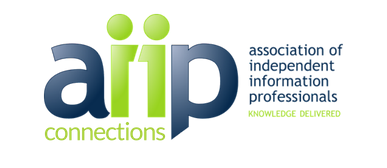Embracing Technological Change: How Info-Entrepreneurs Can Prepare for the Opportunities

Sue Lacey Bryant, currently National Lead for NHS Library and Knowledge Services in England, presented an engaging and thought-provoking keynote at the recent AIIP Annual Conference. A seasoned and gifted information professional with a broad portfolio career throughout the knowledge management industry, Sue opened her talk with a short history on her journey into the information field. Inspired early in life when she made the connection between inequality and lack of access to good information, Sue discovered her why; best captured in the words of Prof. William G. Pollard: “Information is a source of learning. But unless it is organized, processed, and available to the right people in a format for decision making, it is a burden, not a benefit.”
Describing the rapid growth and integration of a variety of new technologies into most industries, with an informative focus on health care, Sue framed her talk around what she referred to as the $64,000 question: Will new technologies be our friend or foe? She presented an excellent overview of the many technologies and technology-enabled approaches disrupting health care and most workplaces, including artificial intelligence (AI), smart devices, machine learning, robotics, and open data. Referring to our current transition as the Fourth Industrial Revolution, Sue discussed several specific technological changes in the medical field and then pivoted to addressing the impact of Industry 4.0 on the information profession.
Referencing a study by researchers at Oxford University and Deloitte, Sue shared with the audience that the job of “librarian” was “too close to call” in terms of the likelihood of being taken over by robots. Although soft skills such as negotiation, assisting others, and idea generation may protect one’s job from automation, info-entrepreneurs need to consider technology as an opportunity rather than a threat. Historically, innovation favors those with the skills to work with new technologies.
Although the fast pace of technological change can be overwhelming, Sue stressed that embracing such change is essential for info-pros. She further challenged us with three questions: 1. How is technology currently impacting our business? 2. What implications does that have for us as individuals? 3. What are the next steps for AIIP?
Discussing the 2021 CILIP report on the impact of new technologies on the information profession, Sue noted the huge opportunity for information professionals to strategically position themselves as a source of trusted and authoritative leadership for clients/users. In terms of specific recommendations for information professionals going forward, the CILIP report highlighted: keeping skills up to date; actively engaging in some of the relevant new technologies (AI, machine learning, automation etc.); sharing knowledge; and promoting an informed, curious, and open vision with clients and colleagues.
Throughout her talk, Sue stressed the critical role of the “human factor” in the implementation of new technology. It is humans who can ensure that new systems are welcomed, and that they enhance jobs and have a positive impact on productivity and workplace satisfaction through effectively designed strategy. In other words, individuals have agency. Leveraging our agency as information professionals is key in answering the $64,000 question on whether these technologies will be our friend or foe. The choice is ours.
Sue Lacey Bryant ended her fascinating keynote with one final question: What will we do as individuals and as an organization (AIIP) to position ourselves to get ahead of the curve and lead?
Maureen Shields, with I Need Maureen (a division of The 42nd Street Group Inc.), helps busy professionals stuck in personal or business transitions figure out why the heck they are so stuck. She helps them strategize a plan to move forward guided by the client’s goals and supported by curated research.





